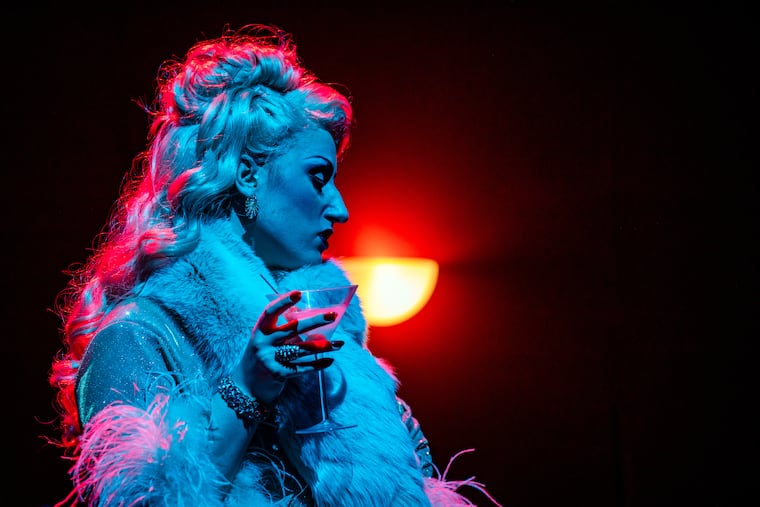Curtis Opera ‘Candide’ is generally good with some exceptional sparks
Leonard Bernstein called this version a 'sliver' of the original, but it manages to entertain and amuse.

Great ideas gone astray immediately tipped off the Friday opening night audience for Curtis Opera Theatre’s Candide to expect a showbiz romp with some twists, rather than satirical social commentary that could give the show renewed bite. That’s a dichotomy that encapsulates the show’s history — it has more versions than Boris Godunov — since it first rose from the repressive chill of 1950s McCarthyism.
The plain set consisting of numerous chairs and doors — painted bordello red — was populated by a few Ziegfeld girls with amazing headgear, a creature from the black lagoon, and a Carmen Miranda look-alike with a trailer park accent. They were all lounging about, along with a director with a megaphone, dating the scene as being from the era of silent films.
Primary Candide characters included the lowborn title character (Landry Allen) looking like a car mechanic, his glamorous girlfriend Cunegonde (Emilie Kealani) resembling a starlet, and the Old Lady (Katie Trigg) stepping in from a Tchaikovsky opera. The previously mentioned director was their ever-optimistic teacher Dr. Pangloss (Emilio Vásquez). If nothing else, character relationships were crystal clear.
The music with the Curtis Symphony Orchestra under David Charles Abell was in good hands with all of the big set pieces making a crowd-pleasing impression. The story, however, became a series of gags — enabled by the production using what’s known as the New York Philharmonic version. The version was fashioned for a PBS telecast relying on Broadway regulars to put across the absurd plot turns.
That’s a tall order in a story about innocent young people coming of age in a corrupt catastrophe-prone world in locales including Lisbon, Paris, Montevideo, and Constantinople — always attempting to find some sort of positive outcome in the best of all possible worlds.
The 1956 Broadway original was a meeting of titans — composer Leonard Bernstein, librettist Lillian Hellman, lyricist Richard Wilbur — though none of the pieces seemed to fit. The show was rescued from obscurity by a 1973 Harold Prince/Stephen Sondheim adaptation that was a sex comedy with global stage settings, but what Bernstein called a “sliver” of Candide.
Slowly, more of the original music was added and new music was written until the version recorded by Bernstein shortly before his death was, by the composer’s admission, too long and not especially stageable.
The Curtis production retreats in the “sliver” direction, still having prescient lines but with highly colored delivery, something like stand-up-comedy punch lines. In her program note, director Emma Griffin mentioned accessing “borscht belt” comedy, and that took the form of emphasizing tired sex jokes and schtick so predictable as to be tedious.
Two scenes were exceptional: When Candide arrived at the mythical utopian kingdom of El Dorado, the stage was dappled in deep-colored hues and a rich field of stars. The final scene, “Make Our Garden Grow,” was treated to a painted backdrop of blue skies and rolling hills that suggested the best of all possible worlds — unattainable but showing what they were aiming for.
The singing was generally good, tenor Allen delivering some of the few emotionally touching moments, and soprano Kealani hitting spectacular high notes. As the vain, snobbish Maximillian, Nathan Schludecker had to carry much of the low humor, but did so with considerable stage savvy.
Other cast members struggled to fill the shoes of the Candide predecessors — amid Jeffrey Page choreography that did little to tell the story but kept the stage in motion. One could wonder why Curtis would produce a Candide that is so (to use a British term) down-market.
Well, any good educational institution prepares its students for making the best of the real world, for better or for worse. And there’s much worse out there.
‘Candide’ will be repeated at 2 p.m. Sunday at Forrest Theatre, 1116 Walnut St. Tickets: $35-$77. curtis.edu